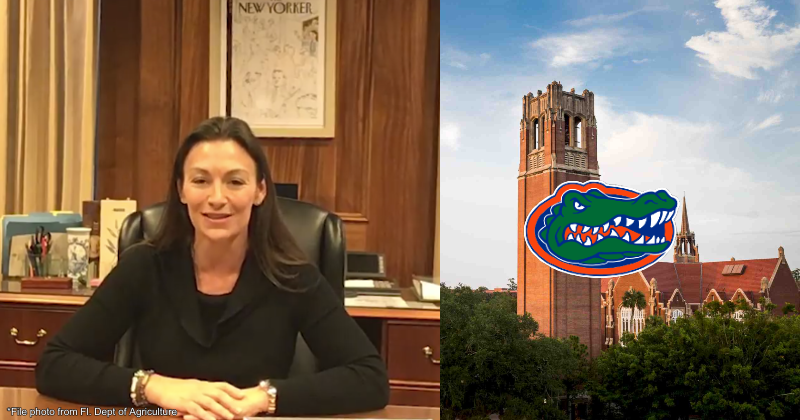This week, Florida Agriculture Commissioner Nikki Fried wrote to the University of Florida Board of Trustees regarding the need for a nonpartisan, transparent, ethical search for the university’s next president.
Fried also expressed reservations regarding the consideration of presidential candidates with anti-public education biases and without higher education leadership qualifications. Fried is a three-time University of Florida alumna, a past Board of Trustees member, a current Board of Trustees member of the Levin College of Law’s Law Center Association, a past student body president, and a past presidential search committee member.
On January 5, University of Florida President Kent Fuchs announced his resignation and transition into a faculty role. Last fall, Fried and others criticized the university for its decision prohibiting professors from testifying on the state’s voter suppression law, which “goes against the school’s interest by conflicting with the administration of Governor Ron DeSantis.” Fried sent an open letter to Fuchs signed by more than 440 UF alumni, students, and citizens across the country insisting upon the reversal of this policy. Fried also insisted “that a controversial out-of-state political appointee for Florida’s Surgeon General was fast-tracked into a tenured university position at the encouragement of a major political donor and Board of Trustees chairman” in the fall. She also claimed that “last month, it was revealed that university faculty were pressured to destroy COVID-19 data and were prohibited from criticizing the Governor’s or UF’s pandemic policies.”
Fried’s letter is below.
Dear Board of Trustees Members,
As a three-time alumna of Florida’s preeminent institution of higher education, as a past Board of Trustees member, as a current Board of Trustees member of the Levin College of Law’s Law Center Association, and as a past presidential search committee member, I write today regarding the ongoing search for the University of Florida’s next president.
In recent months, allegations of inappropriate political influence have rocked the credibility, reputation, and even accreditation of the University of Florida. The fallout from these allegations has been chronicled in lawsuits and in the media, reporting that “political pressures are jeopardizing the academic integrity of the state’s flagship university.”
From barring politically inconvenient expert testimony of highly-regarded professors to fast-tracking the employment of an out-of-state political appointee into a tenured position, there remain serious concerns as to how the Board of Trustees and the university itself intend to not only remedy these past mistakes, but exculpate the institution from future undue political meddling.
As you may recall, I led an open letter signed by over 440 University of Florida alumni, students, parents, and stakeholders insisting that the university reverse these actions and policies. Since then, additional disturbing allegations have emerged of restricting curricula on racial justice matters with which certain political leaders may disagree.
Allow me to express in the clearest terms: it is absolutely necessary that the search for the university’s next president be fully ethical, transparent, and nonpartisan, free from all political influence. While several among you are major contributors to the current Governor of Florida, the preferences of politicians cannot be a factor in selecting a president who will lead the university’s top-5 national ranking, $6 billion budget, and $2 billion endowment into the next generation.
Neither should politicians, simply by proximity to power, be among your leading options for this role so critically important to the university’s integrity and vision. Should you consider the Governor’s appointed Commissioner of Education, Richard Corcoran, I will remind you that his candidacy to lead the Florida State University was opposed by faculty and threatened to jeopardize its accreditation through conflicts of interest. Commissioner Corcoran also lacks the academic leadership qualifications necessary to succeed in this role. A politician described as “an enemy of public education” should not grace your list of serious candidates to lead the state’s flagship public institution. Given that 85 percent of U.S. college presidents are prior collegiate deans, provosts, chancellors, or other senior executives in higher education, and with nearly half holding degrees in education, I would encourage you to pursue a leader with demonstrated success at managing a top academic institution.
Generations of students, instructors, staff, and alumni have labored to buttress the University of Florida’s path towards becoming one of the nation’s very best public universities. We cannot allow the winds of political whim to derail the progress of our alma mater. Neither can we stand by while academic freedom is curtailed in the name of political expediency.
I trust the Board of Trustees will conduct itself beyond reproach in the public search to fill the presidency of the University of Florida. Anything less is beneath the august institution founded 168 years ago, whose motto reminds us that our welfare depends on the morals of citizens, such as yourselves.
Go Gators.




















